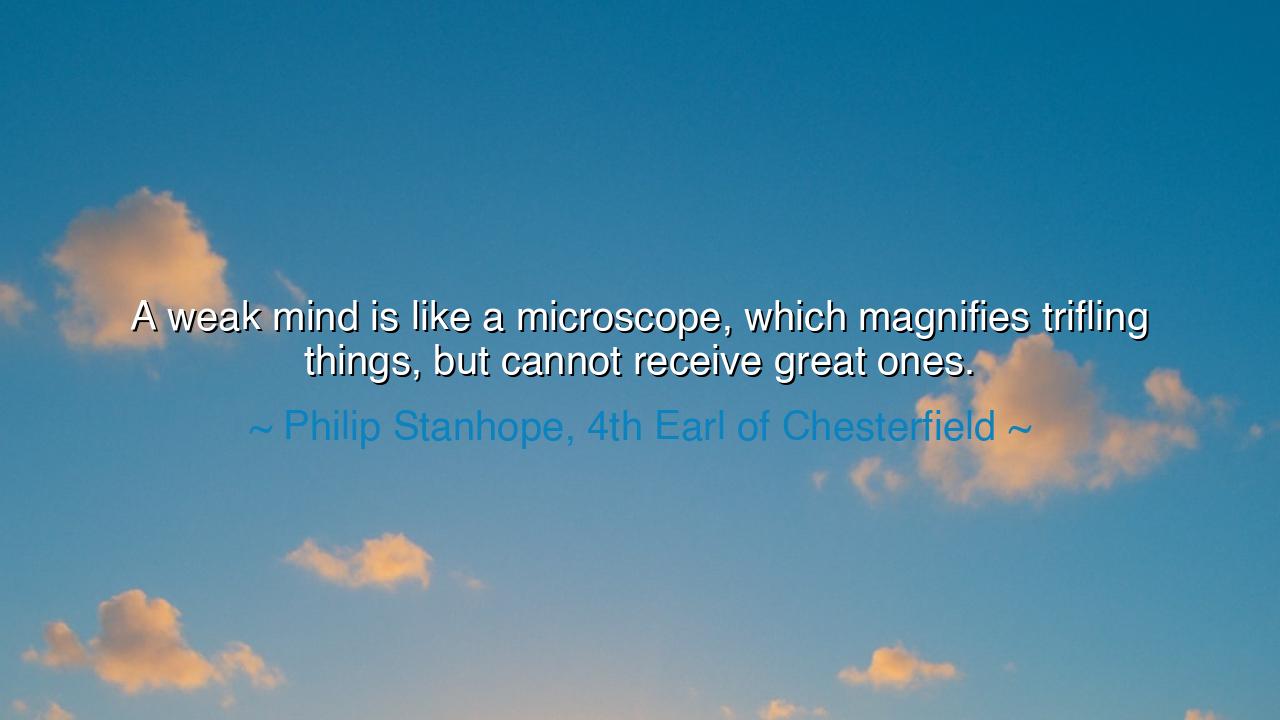
A weak mind is like a microscope, which magnifies trifling
A weak mind is like a microscope, which magnifies trifling things, but cannot receive great ones.






“A weak mind is like a microscope, which magnifies trifling things, but cannot receive great ones.” — Philip Stanhope, 4th Earl of Chesterfield
In this elegant and piercing observation, Philip Stanhope, the 4th Earl of Chesterfield, exposes one of the great failings of human nature — the tendency of the small mind to dwell upon small matters. His metaphor is as vivid as it is wise. A microscope, he tells us, can see minute details with great precision, but it cannot perceive the vastness of a mountain, the sweep of the stars, or the magnitude of truth. So too is the weak mind — obsessed with trifles, blind to greatness. It fixates on petty grievances, gossip, and appearances, while missing the noble and the eternal. It measures life in inches where it should measure in horizons.
The Earl of Chesterfield, an English statesman and man of letters in the 18th century, wrote this line in one of his famous “Letters to His Son”, a series of writings filled with lessons on manners, intellect, and character. His intent was to raise his son not only to be learned, but wise — to possess a mind capable of discernment, one that could rise above the noise of vanity and triviality. He had seen, in the courts of kings and the councils of statesmen, how many men of great station were nonetheless prisoners of their narrow thoughts. To such men, a perceived insult was greater than an empire, and a fleeting pleasure more important than posterity. Thus, Chesterfield warned: a mind that cannot grasp greatness will forever be enslaved to the small.
The meaning of his teaching reaches far beyond the drawing rooms of 18th-century England. Even in our own time, the weak mind is easy to find — forever magnifying the insignificant. It worries endlessly about reputation while neglecting virtue. It argues loudly about opinions while ignoring truth. It gossips about people but never contemplates ideas. Such a mind lives in perpetual agitation, because its world is too small to contain peace. It finds comfort in judgment, not in understanding. Like the microscope, it is precise — but pointless, focused sharply on the dust while blind to the divine.
Contrast this with the great mind, which does not shrink its gaze to the trivial but expands it to the infinite. The great mind endures insult without bitterness, for it sees how brief all human quarrels are against the backdrop of eternity. It seeks not to magnify the fault in others but to magnify truth itself. It looks upon the world and sees not details alone, but patterns, connections, and principles. Where the weak mind finds offense, the great mind finds understanding; where the weak mind finds gossip, the great mind finds silence. For true greatness of thought is not the absence of detail, but the mastery of proportion — the ability to know what matters, and what does not.
History offers many examples of this contrast. Consider Marcus Aurelius, emperor of Rome, who governed an empire yet kept his soul tranquil amidst chaos. Surrounded by intrigue, flattery, and betrayal, he did not magnify these trifles, but turned his mind toward the eternal — toward virtue, duty, and the order of the cosmos. His meditations still endure, while the petty voices of his court have long been silenced by time. Or look to Socrates, condemned unjustly by the ignorance of his peers. A weak mind would have raged or despaired; but Socrates, gazing upon the eternal idea of justice, drank the hemlock with serenity. He saw beyond the moment — beyond the microscope of mortal concern — into the boundless vision of truth.
And yet, let none imagine that this wisdom is easily gained. To rise above smallness requires discipline of mind and humility of heart. The world tempts us constantly to magnify trifles — to react to every slight, to chase every rumor, to envy, to judge. The mind, like a lens, must be trained to focus rightly. The ancients taught this as detachment; the Stoics called it ataraxia, the stillness of soul. To cultivate it, one must practice discernment daily — asking of each thought, “Does this matter?” and of each emotion, “Is this worthy of my peace?” In this way, the mind grows strong, and the small things lose their power.
So, O seeker of wisdom, take this teaching as a mirror for your own mind. Do not live as a microscope, scrutinizing dust while blind to glory. Lift your gaze toward what is vast — toward virtue, truth, and the eternal. Let your thoughts be wide as oceans and deep as mountains. When small minds quarrel, keep your silence; when trivial matters arise, rise above them. For the strength of the mind is not in how sharply it sees, but in how greatly it perceives. Remember the Earl’s words, and live by them: magnify not the trifles, but the truth; for in that lies the difference between the petty and the great — between the weak mind and the wise soul.






AAdministratorAdministrator
Welcome, honored guests. Please leave a comment, we will respond soon